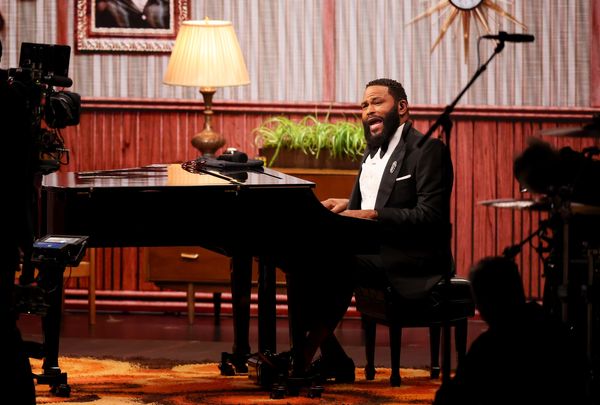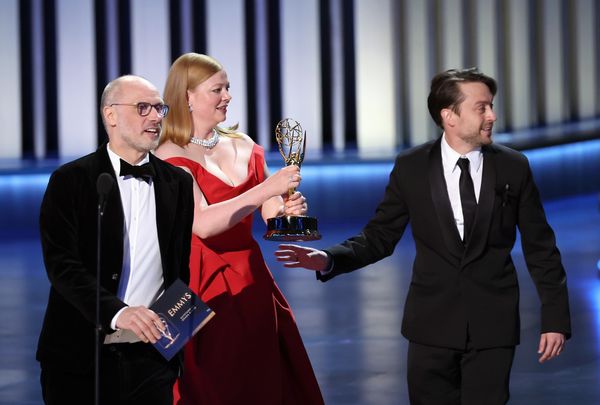
There was no way for the 75th Emmy Awards to feel current. Delayed by the double strikes by the Writers Guild of America and SAG-AFTRA – the former ending on Sept. 27, 2023, the latter lasting until Nov. 9, 2023 – the 75th's batch of hardware honors a season that’s been over for most of a year. The top wins, though predictable, felt appropriate because they were unforgettably good.
But consider best comedy winner “The Bear” as an example of what I’m talking about. The FX not-a-comedy took home wins for best comedy, best actor for Jeremy Allen White and best supporting actress and actor for Ayo Edebiri and Ebon Moss-Bachrach. Anyone who saw Season 2 would find no reason to quibble with those victories.
Here’s the thing – these honors were for work done in the show’s first season. It’s unclear whether that would have felt any less strange in September 2023, but watching it happen in 2024 feels like we’re playing catch up.
“Succession” winning best drama also felt right but distant from when its stunning season aired. Individual awards for Matthew Macfadyen, Sarah Snook and Kieran Culkin, with series creator Jesse Armstrong and director Mark Mylod clinching awards for the stellar “Connor’s Wedding” episode, were spot-on too. That also aired last April.
“Beef” slaughtering the limited series categories was also preordained, along with the individual wins for its stars Steven Yeun and Ali Wong, who became the first woman of Asian descent ever to win an Emmy for a lead role.
Factor in the writing and directing clinches for creator and showrunner Lee Sung Jin, these were good wins. So was Quinta Brunson’s win in the best actress comedy category for her work in “Abbott Elementary,” making her the first Black woman honored in that category in more than 40 years. (Isabel Sanford, star of “The Jeffersons,” took home the award in 1981 before her.)
Between chronological disconnect and the general sense that there was no way for this Emmy to win an awards season pageant it had no choice but to crash, the producers made the smartest choice possible given their circumstances.
They took a loving gaze backward to the "good old days."
A somewhat ironic thought, given the Emmys’ scheduling on a day meant to honor Martin Luther King, Jr., and the strong showing of diverse winners in major categories in which “Succession” was not nominated. This Emmys telecast’s strengths were not expressly about who ended up with hardware, however. The main reason to celebrate was to notice who was heard and how.
Emmys host Anthony Anderson hinted at nostalgia driving the night by opening the evening with an homage to “Mister Rogers’ Neighborhood” and TV themes, including “The Fact of Life” and "Good Times," along with “In the Air Tonight” – which was not the theme to “Miami Vice,” but might as well have been.

This bought the show a share of goodwill in this time of awards show fatigue, especially a week after an abysmal Golden Globes outing that crawled forth for too long.
Contrast this with the enthusiastic standing ovation for Christina Applegate, the night’s first presenter, representing disabled performers by being her humorous self as she addressed the impact that multiple sclerosis has had on her. Addressing the crowd Applegate deadpanned, “You’re totally shaming me by standing up; it’s fine. Body not by Ozempic – OK, let’s go!”
Later Niecy Nash-Betts marked her limited series best supporting actress win for “Dahmer—Monster: The Jeffrey Dahmer Story” – her first after four nominations — with a legendarily self-affirming declaration.
“You know who I wanna thank? I want to thank me,” she said. “For believing in me and doing what they said I could not do. I want to say to myself in front of all you beautiful people: ‘Go on, girl with your bad self. You did that!’” on behalf of all the Black women who have been underheard and overpoliced. At this she invoked the names of Glenda Cleveland, who she played in "Dahmer," alongside Sandra Bland, who died while in police custody, and Breonna Taylor, who was shot to death by law enforcement officers.
Weaving politics into awards show telecasts tends to raise conservatives’ blood pressure, but this broadcast was noteworthy for the space such moments received. RuPaul Charles, whose show “RuPaul's Drag Race” is a five-time best reality competition winner and is the most awarded host in Emmys history with eight wins, holding the record for most wins by a person of color, used his return to the Emmy stage to speak out against the right-wing demonizing drag.
“Listen, if a drag queen wants to read you a story at a library, listen to her,” he said. “Because knowledge is power. And if someone is trying to restrict your access to power, they are trying to scare you. So listen to a drag queen!”
“Last Week Tonight” scribe Sofia Manfredi acknowledged the show’s producers for backing them up during the strike, along with the Writers Guild of America as she accepted the Emmy for best writing for a variety series. “The strike felt long,” she said. “It did not feel lonely.”
Even "Succession's" Armstrong, a white guy who created the biggest drama on TV, took a swing at the right wing media ecosystem. “This is a show about family, but it’s about when partisan news coverage gets intertwined with divisive right-wing politics,” he said, adding drolly, “And after four seasons of satire, as I understand it, that’s a problem we have now fixed. So we can now depart the stage.”
Monday’s Emmys also contained many genuinely moving moments, such as Brunson breaking into tears at receiving her award from Carol Burnett, acknowledging what it means for Burnett to pass that torch to her.
Edebiri following her charming Globes acceptance speech with this shout-out to her parents felt like a moment of true gratitude. “Thank you so much for loving me and letting me feel beautiful and Black and proud of all that,” she said. “It’s probably not, like, a dream to immigrate to this country and have your child be like ‘I want to do improv!’ But you’re real ones.”

Still, this Emmys was defined by expediency – some of it in the comedic set-up of foregoing the usual play-off music. “This year, I’ve got something that nobody can ignore: my mama,” Anderson said referring to his “We Are Family” co-host and, yes, his actual mother Doris Bowman, mic'd up and sitting in the audience. “When you see my mama coming, thank Jesus and wrap it up.”
Bowman wasn’t playing.
When supporting actress drama winner Jennifer Coolidge adorably yammered on too long and thanked “all the evil gays” while accepting her award for “The White Lotus,” Bowman rose from her fifth-row seat and cut her off with, “Baby . . . baby . . . I love you, baby, but time!”
People either found this very charming or, if they happened to be humorless, rude. When John Oliver accepted the best variety sketch series Emmy for “Last Week Tonight” he intentionally began listing the names of British soccer players to goad Bowman’s playful wrath, only to immediately thank Jesus before zipping offstage.
Employing Anderson as a light touch – cartilage binding one segment to the next instead of a showstopper – was the right play. This was a very Norman Lear Emmys by inference and reference; the "All in the Family" living room made an appearance the show, and its creator topped an "In Memoriam" segment that tastefully wove the "Friends" theme refrain into its melodic lament. Incorporating past casts and sets throughout the broadcast as opposed to pausing to show montages of archival footage kept the action feeling alive instead of stilted, enabling viewers to remain a part of the action instead of removing us from it.
This also had the effect of reining in the stilted scripts, leaving more room for the winners and a couple of performers to bring their personalities into the telecast. Pedro Pascal paused before presenting the award for drama supporting actor to respond to Culkin jokingly telling him to “suck it” at the Globes by explaining why his arm was in a sling.
“I'd like to take just a second and make this about me. A lot of people have been asking about my arm,” Pascal said. “It's actually my shoulder. And I think tonight is a perfect time to tell everyone that Culkin beat the s**t out of me,” as Culkin pretended to coldly stare up at him from his seat.
I’m going to guess those lines weren’t in the teleprompter, but the bit played spectacularly because Pascal is charming and Culkin committed to it too. Such moments gave this highly scripted 75-year celebration a touch of spontaneity that broke up the museum tour.
If you’re a TV nerd, a solid walk through history that manages to be entertaining can be a gift. It reminds the audience of why TV is worth celebrating and the winners of the history that came before them.
An outro featuring a clip of King’s “I Have a Dream” speech provided a final reminder of where we are on 2024's calendar, along with the meaning of these wins in the wider span of TV’s existence. And if some of these victories felt late, that’s fair. The Emmys will get another shot at bringing the institution up to date sometime this fall.







